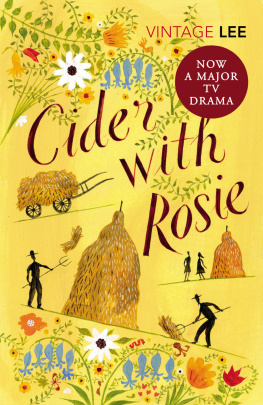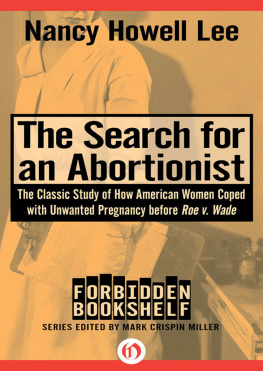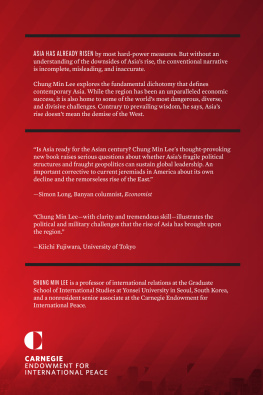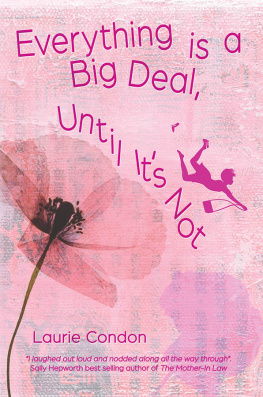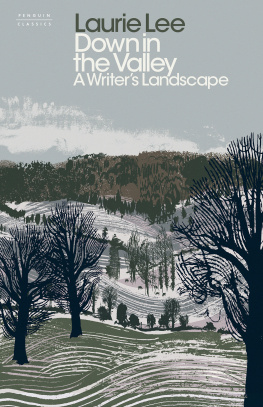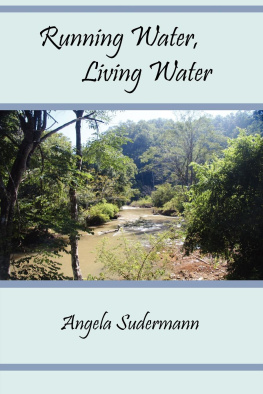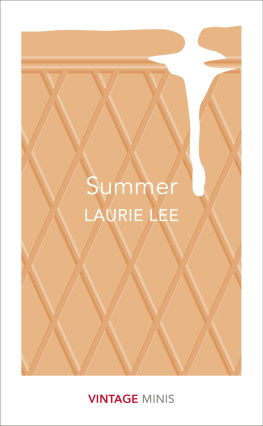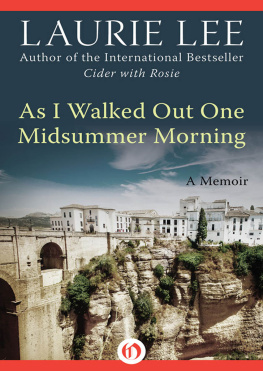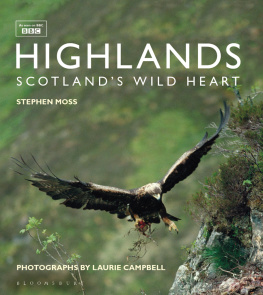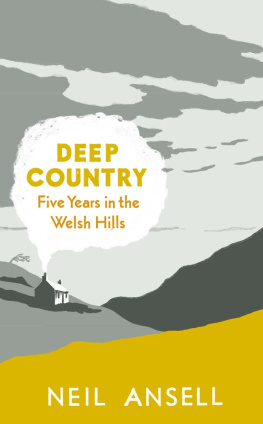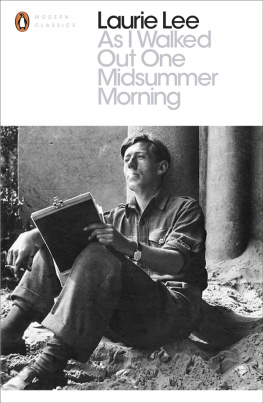LAURIE LEE
Cider with Rosie
WITH DRAWINGS BY
John Ward

This ebook is copyright material and must not be copied, reproduced, transferred, distributed, leased, licensed or publicly performed or used in any way except as specifically permitted in writing by the publishers, as allowed under the terms and conditions under which it was purchased or as strictly permitted by applicable copyright law. Any unauthorized distribution or use of this text may be a direct infringement of the authors and publishers rights and those responsible may be liable in law accordingly.
Epub ISBN 9781407073361
Version 1.0
Vintage
20 Vauxhall Bridge Road,
London SW1V 2SA
Vintage is part of the Penguin Random House group of companies whose addresses can be found at
global.penguinrandomhouse.com

Copyright Laurie Lee 1959
Laurie Lee has asserted his right to be identified as the author of this Work in accordance with the Copyright, Designs and Patents Act 1988
First published in Great Britain in 1959 by The Hogarth Press
Published by Vintage 2002
www.vintage-books.co.uk
A CIP catalogue record for this book is available from the British Library
ISBN 9780099285663
CONTENTS
About the Author
Laurie Lee was born in Stroud, Gloucestershire, in 1914, and was educated at Slad village school and Stroud Central School. At the age of nineteen he walked to London and then travelled on foot through Spain, as described in his book As I Walked Out One Midsummer Morning. In 1950 he married Catherine Polge and they had one daughter. Cider with Rosie (1959) has sold over six million copies worldwide, and was followed by two other volumes of autobiography: As I Walked Out One Midsummer Morning (1969) and A Moment of War (1991). Laurie Lee also published four collections of poems, The Sun My Monument (1944), The Bloom of Candles (1947), My Many-Coated Man (1955) and Pocket Poems (1960) as well as The Voyage of Magellan (1948), a verse play for radio, A Rose for Winter (1955), which records his travels in Andalusia, The Firstborn (1964), I Cant Stay Long (1975), a collection of his writing, and Two Women (1993). Laurie Lee died in May 1997.
ALSO BY LAURIE LEE
The Sun My Monument
The Bloom of Candles
The Voyage of Magellan
My Many-Coated Man
A Rose for Winter
Pocket Poems
The Firstborn
As I Walked Out One Midsummer Morning
I Cant Stay Long
Two Women
A Moment of War
NOTE
The book is a recollection of early boyhood, and some of the facts may be distorted by time.
FIRST LIGHT
I WAS SET down from the carriers cart at the age of three; and there with a sense of bewilderment and terror my life in the village began.
The June grass, amongst which I stood, was taller than I was, and I wept. I had never been so close to grass before. It towered above me and all around me, each blade tattooed with tiger-skins of sunlight. It was knife-edged, dark, and a wicked green, thick as a forest and alive with grasshoppers that chirped and chattered and leapt through the air like monkeys.
I was lost and didnt know where to move. A tropic heat oozed up from the ground, rank with sharp odours of roots and nettles. Snow-clouds of elder-blossom banked in the sky, showering upon me the fumes and flakes of their sweet and giddy suffocation. High overhead ran frenzied larks, screaming, as though the sky were tearing apart.
For the first time in my life I was out of the sight of humans. For the first time in my life I was alone in a world whose behaviour I could neither predict nor fathom: a world of birds that squealed, of plants that stank, of insects that sprang about without warning. I was lost and I did not expect to be found again. I put back my head and howled, and the sun hit me smartly on the face, like a bully.
From this daylight nightmare I was awakened, as from many another, by the appearance of my sisters. They came scrambling and calling up the steep rough bank, and parting the long grass found me. Faces of rose, familiar, living; huge shining faces hung up like shields between me and the sky; faces with grins and white teeth (some broken) to be conjured up like genii with a howl, brushing off terror with their broad scoldings and affection. They leaned over me one , two, three their mouths smeared with red currants and their hands dripping with juice.
There, there, its all right, dont you wail any more. Come down ome and well stuff you with currants.
And Marjorie, the eldest, lifted me into her long brown hair, and ran me jogging down the path and through the steep rose-filled garden, and set me down on the cottage doorstep, which was our home, though I couldnt believe it.
That was the day we came to the village, in the summer of the last year of the First World War. To a cottage that stood in a half-acre of garden on a steep bank above a lake; a cottage with three floors and a cellar and a treasure in the walls, with a pump and apple trees, syringa and strawberries, rooks in the chimneys, frogs in the cellar, mushrooms on the ceiling, and all for three and sixpence a week.
I dont know where I lived before then. My life began on the carriers cart which brought me up the long slow hills to the village, and dumped me in the high grass, and lost me. I had ridden wrapped up in a Union Jack to protect me from the sun, and when I rolled out of it, and stood piping loud among the buzzing jungle of that summer bank, then, I feel, was I born. And to all the rest of us, the whole family of eight, it was the beginning of a life.
But on that first day we were all lost. Chaos was come in cartloads of furniture, and I crawled the kitchen floor through forests of upturned chair-legs and crystal fields of glass. We were washed up in a new land, and began to spread out searching its springs and treasures. The sisters spent the light of that first day stripping the fruit bushes in the garden. The currants were at their prime, clusters of red, black, and yellow berries all tangled up with wild roses. Here was bounty the girls had never known before, and they darted squawking from bush to bush, clawing the fruit like sparrows.
Our Mother too was distracted from duty, seduced by the rich wilderness of the garden so long abandoned. All day she trotted to and fro, flushed and garrulous, pouring flowers into every pot and jug she could find on the kitchen floor. Flowers from the garden, daisies from the bank, cow-parsley, grasses, ferns, and leaves they flowed in armfuls through the cottage door until its dim interior seemed entirely possessed by the world outside a still green pool flooding with honeyed tides of summer.
I sat on the floor on a raft of muddles and gazed through the green window which was full of the rising garden. I saw the long black stockings of the girls, gaping with white flesh, kicking among the currant bushes. Every so often one of them would dart into the kitchen, cram my great mouth with handfuls of squashed berries, and run out again. And the more I got, the more I called for more. It was like feeding a fat young cuckoo.
The long day crowed and chirped and rang. Nobody did any work, and there was nothing to eat save berries and bread. I crawled about among the ornaments on the unfamiliar floor the glass fishes, china dogs, shepherds and shepherdesses, bronze horsemen, stopped clocks, barometers, and photographs of bearded men. I called on them each in turn, for they were the shrines and faces of a half-remembered landscape. But as I watched the sun move around the walls, drawing rainbows from the cut-glass jars in the corner, I longed for a return of order.
Next page
